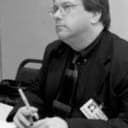Stay in the Loop
BSR publishes on a weekly schedule, with an email newsletter every Wednesday and Thursday morning. There’s no paywall, and subscribing is always free.
The iconoclastic generalist
Freeman Dyson's 'Dreams of Earth and Sky'

Why don't plants have black leaves rather than green? After all, it's through their leaves that plants absorb the solar energy that keeps them alive, and the color black absorbs sunlight far more efficiently than does green. So why has evolution made leaves green instead? The answer could provide vital clues for better solar energy resources.
This is the sort of question that scientists like Freeman Dyson ponder — issues that span multiple realms of science while incorporating a healthy dose of speculative imagination. It's the calling card of the generalist, which has become something of an endangered species in science, as circumstances both practical and economic have forced working scientists into ever smaller and more precisely circumscribed pigeonholes. But, as evidenced by his new book of essays, Dreams of Earth and Sky (New York Review Books, 2015), Dyson remains stubbornly polymath, something he also ably demonstrated in a recent Free Library of Philadelphia author event.
Born in Great Britain and trained as a mathematical physicist, Dyson settled in the U.S. in 1953, when he accepted a permanent appointment at the Institute for Advanced Study in Princeton. Home of luminaries like Albert Einstein, the Institute was conceived as an intellectual sanctuary where such geniuses could follow their individual researches and ruminations with complete freedom. It's proved a perfect home for Dyson's restless, versatile mind, and over the past six decades, he's contributed seminal work in a wide range of disciplines including quantum physics, astronomy, pure mathematics, and even biology, while also serving as a governmental advisor and consultant.
He's also produced a collection of elegantly written science books, including Disturbing the Universe, Weapons and Hope, Infinite in All Directions, and The Scientist as Rebel, for which his new book serves as a sort of sequel. Like that 2006 volume, Dreams of Earth and Sky is mostly a collection of Dyson's reviews for the New York Review of Books, and its resulting variety of topics, ranging from climate change to history of science to poetry to sketches of colleagues like Richard Feynman and Robert Oppenheimer, makes it an excellent intro to the Dyson worldview.
Model critic
In recent years, the iconoclastic Dyson has gained a bit of notoriety for criticizing current models of climate change (though not denying the phenomenon outright) and for arguing that rocket pioneer Wernher von Braun's involvement in Nazi war crimes shouldn't be allowed to overshadow his more positive contributions. But even as he questions prevailing orthodoxy, he's also always willing to question and change his own positions. Sprinkled amongst his own words in Dreams of Earth and Sky are some of the passionate rebuttals and criticisms that he's received, since, as he notes, "I learn more from critics than from flatterers."
At the Free Library event, Dyson was interviewed by Drexel University physics professor and science writer Dave Goldberg. Despite the physical frailty of his 91 years, Dyson's intellect obviously remains wholly unfettered, as does his wicked but self-deprecating sense of humor. Describing his unusually eclectic career trajectory as a process of becoming ever "broader and broader and shallower and shallower," he deftly fielded a mix of questions from Goldberg and the audience on matters both scientific and philosophical, demonstrating that while his interests and knowledge are indeed broad, they are also anything but shallow.
And as a scientist who has wrestled firsthand with the moral quandaries of mass destruction and total war, first while serving as an analyst with RAF Bomber Command in World War II and later as a consultant and advisor to America's military establishment, Dyson is quite aware of the seemingly intransigent problems that continue to plague humanity. But he's confident that science, free inquiry, and democracy will yet allow the better angels of human nature to prevail and prosper. "Having survived the 1930s, I can't help being an optimist," he observes.
Oh, and that question about the leaves? We don't know. Yet. Dyson has some interesting thoughts on the matter, but without enough facts upon which to base a solid conclusion, he refrains from any definitive pronouncements — and even if he ventured one, it would always be open to revision upon further investigation. That's how science works. Encountering a mind like Dyson's makes one long for such a practice to be extended to other areas of human endeavor.
What, When, Where
Dreams of Earth and Sky. By Freeman Dyson. New York Review Books, 2015. 312 pages; $27.95. Available on Amazon.
Sign up for our newsletter
All of the week's new articles, all in one place. Sign up for the free weekly BSR newsletters, and don't miss a conversation.

 Mark Wolverton
Mark Wolverton